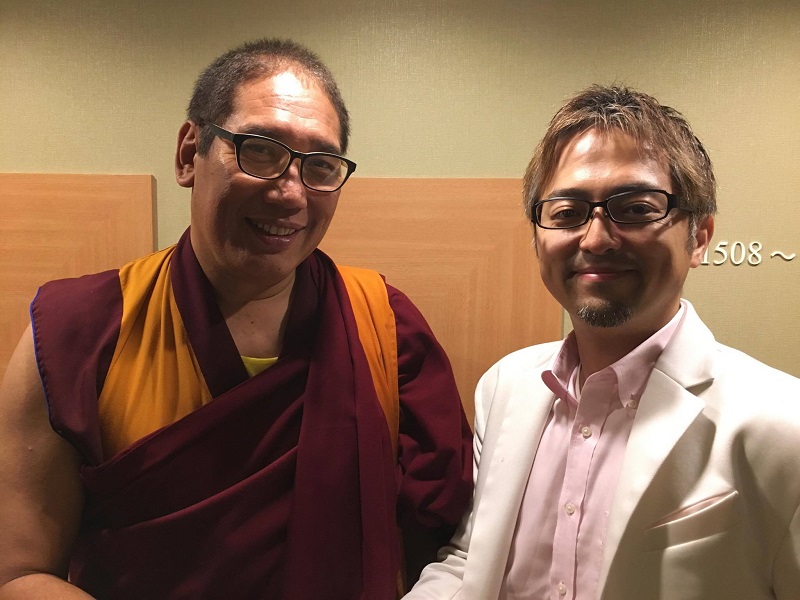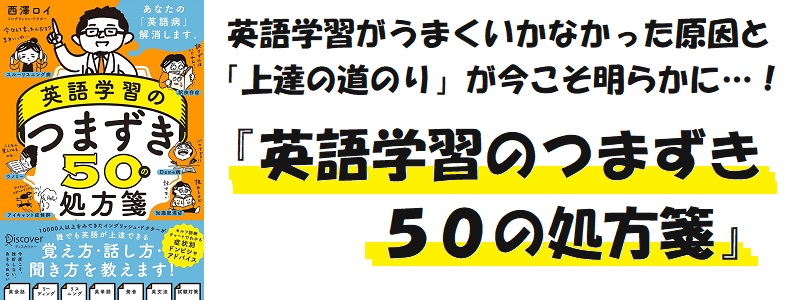ページコンテンツ
こんにちは、イングリッシュ・ドクターの西澤 ロイです。
ラジオ番組「めざせ!スキ度UP」においても、
チベット仏教の高僧、
ザ・チョジェ・リンポチェ師
ZaChoeje Rinpoche
をお迎えして、特別インタビューをさせていただきました。
「めざせ!スキ度UP」で日本語のナレーションを
かぶせて放送されたバージョンのバックナンバー、
および、その元となった英語音声については
スキペディアに解説付きで掲載されています。
英語音声(全編)
英語音声は以下からもお聴きいただけます。
このインタビューにつきまして、
英語の文字起こしと、日本語訳を
(3回に分けて)以下に掲載いたします。
今回は前回の続きとして、リンポチェ師ご自身について
お伺いした後、お聞きしたかったこの質問をぶつけて
みました。
Q.スキルアップをしたいならまずは「スキ度」を高めよう
という「めざせ!スキ度UP」のコンセプトについて
どう思われますか?
ザ・チョジェ・リンポチェ師のインタビュー全文3
どうしてそのポジションまで辿り着けたと思いますか?
――Some people might think that the you are a chosen few, or just lucky to be selected.
(あなたのことを、選ばれたごく一部の人だとか、幸運なだけだと妬む人もいるかもしれません)
I don’t know if it happens in Tibet, but it happens in other parts of the world, right?
(チベットでそうなのかは分かりませんが、大部分の世界ではそう考える人もいるでしょう)
So when you look back, what made you to be who you are right now?
(振り返ってみて、どうしてそのポジションまで辿り着けたと思いますか?)
Yes, I think that maybe I’m lucky.
(はい、たぶん幸運だったのだろうと思います)
You know, it doesn’t happen to everybody that way.
(全員に起こるような出来事ではありませんから)
Out of many people, I got the letter, which was saying that you are, you know, a spiritual boy, sacred boy.
(私は大勢の中から選ばれて手紙が届き、お前は聖人の生まれ変わりだと言われました)
And that would not happen to many people.
(それは多くの人には起こらない出来事です)
So somehow it happened to me. And why it happened to me?
(でも、なぜか私には起こったのです。一体なぜなのでしょうか?)
Maybe it is a luck. So I was lucky.
(運なのかもしれません。私は運が良かったのでしょう)
But then, after that happened, basically it really changed my life.
(その後、それによって私の人生は大きく変わりました)
Somehow I was lucky that I was going in a different direction and then you know Dalai Lama picked me up energetically, saying “No, no, no. You’re not going that way. You are going this way.”
(私は別の方向に向かっていたのですが、ダライラマ法王が私のことをエネルギー的に選んでくださり、「そっちではなくて、こっちを行くんだ」と言ってくださったのは、ある意味で幸運なのです)
So, it’s just kind of like putting me on the different path, which I always feel honored and privileged.
(私を新たな道に導いてくださったことは非常に名誉であり、光栄なことです)
And I’m always thinking what karma I did in my past life that happened to me.
(私はいつも、過去のどんなカルマの影響なのだろうと考えます)
この幸運を仏教的には「カルマ」と呼ぶ
So maybe if you look at it from a general point of view, it is a luck, but then from a Buddhist point of view, then we say it’s a karma.
(一般的な視点では「幸運」と呼びますが、仏教的には「カルマ」と呼びます)
Like maybe I did something in my past life, you know.
(過去生において、私が何かをしたのかもしれません)
Many times, there is a prayer. Prayer is very powerful. Like something needs to happen.
(また、何かが起こって欲しいという祈りがあったのかもしれません。祈りは非常に強力ですから)
First, we need a prayer and then take action.
(手順としては、まず祈ったら、その後は行動に移す必要があります)
You know, we need to have intention and wish first.
(最初に意図や願いが必要なのです)
And then not just staying in the wish, take action.
(でも、ただ願うだけではなく、行動が重要です)
I don’t know maybe this is called incidents or something. But my previous one, you know. He died in the prison, in a Chinese prison, communist prison in nineteen six something.
(これは偶然と呼ばれるのかもしれませんが、前世の私は1960何年かに中国の刑務所で亡くなりました)
He was a political prisoner. And he spent four years in prison and died.
(彼は政治犯として逮捕され、4年後に刑務所で死亡したのです)
There was a lot of stories actually. I met with some of his prison mates later.
(いろんな話を聞きました。同時期に収容されていた数名に直接お会いしたのです)
He was a short guy. He was playing with other cell mates.
(前世の私は背が低くて、他の囚人らと楽しくしていたそうです)
This life, my body, I’m short. I don’t like it. So, I am praying. He always said I pray that next life I will become tall.
(今世では背が低いことが気に入らないから、祈っていたそうです。来世では背が高くなるように)
So I’m praying and then he was like joking, sort of like playing with them. Maybe you will see maybe you will hear that my next body will be tall.
(そして彼は祈りつつ、冗談を言っていたそうです。来世の私が背が高くなったことを、あなたは見たり聞いたりして知るだろうと)
That’s what he used to say.
(そんなことを言っていたそうです)
And the same thing like he didn’t actually complete his studies. We say graduation is like Geshe is a degree. Geshe Lharampa means kind of degree.
(そして同様に、彼は学校を卒業していないのです。ハランバという学位を持っていませんでした)
And he actually didn’t get to to study too much in the monastery.
(また、僧院でもあまり勉強することができませんでした)
And he said “I really regret that I didn’t complete my studies.”
(彼はこう言ったそうです。「私は学問をきちんと修められなかったことが残念です」)
“And so I’m praying. Next life, my reincarnation will complete my study and get a Geshe degree.”
(「だから祈るのです。次の人生では、学問を納め、学位を取りたいのです」と)
So those things actually, kind of like he said and he prayed… but many things that he said and he prayed, it actually happened to me.
(これらの、彼が言い、そして祈った物事の多くが実は、私の人生で実現しているのです)
I don’t know maybe that’s what I believe kind of thing. Sometimes, you know, maybe it is not what I did in this life. Maybe something I did in my past life.
(信じるか信じないかという話になってしまいますが、私が今世でしたことではなく、前世でしたことのお陰なのかもしれません)
これまでの人生で、辛いと思ったことはあるか?
――What was your hardest time or hardest struggle in your life?
(人生において一番大変だったことや、一番もがいた経験を教えてください)
Hardest struggle. Hardest time. Hum…
(一番もがいたことや大変だったことですね。ふーむ)
There are many occasions, right? Life is actually full of struggles.
(そういう場面はたくさんあると思います。人生は苦難の連続ですから)
We struggle many times. When we are studying, we are struggling. And we are actually working we are struggling.
(もがく場面はたくさんあります。勉強をしていても、仕事をしていても、もがくわけです)
There’s a lot of struggle.
(とにかくたくさんあります)
I don’t know if you ask me what is my hardest struggle.
(だから、一番大変な経験と言われても分かりません)
Generally I think life is full of struggles.
(一般的に言うと、人生には大変なことがたくさんあります)
And so it depends on how you actually see the struggles.
(だから、あなたがそれらの苦難をどう受け止めるかが大事なのです)
人生における苦難をどう受け止めるとよいか
You know like it can be same struggle, but if you look at it with a narrow mind, then even though the struggle is small it will become very big, huge.
(同じ苦難であっても、狭い心で見ると、小さいはずの苦難が、とても大きく、巨大に見えます)
You know just for example, like if I am looking at a pen.
(例えば、私が1本のペンを見ていたとしましょう)
So if I look it from here, it is small, right? Like more distance, it is small.
(もしちょっと離れたここから見ると、小さいですよね。距離が離れるほど、小さく見えます)
So the more closer I take it, it becomes bigger and bigger.
(でも、目の近くに持ってくると、どんどん大きく見えるのです)
So sometime I have this kind of like… maybe I don’t know, because of my meditation or spiritual kind of practice, every time when there is a situation, difficult situation that I see, I always look at it to sort of like… “okay, so this will go away.”
(私が瞑想や精神修行をしているからなのかもしれませんが、もし大変な状況がやってきた時に、私は「まあ、この状況も永遠には続かない」と思うのです)
And this is not a life and death situation.
(また、生死がかかるような場面でもありません)
So then I always find some positive things to look at the struggle.
(だから次に、苦難の中でもいつも、良いことを見つけるようにします)
you know, all the struggles are not bad.
(苦難が悪いものとは限りませんから)
You know struggles… like many times, challenges come in our life.
(まず、苦難やチャレンジが人生の中に起こります)
And then the challenges actually are sometimes given by other people sometime given by a different situations, circumstances in our life.
(そのようなチャレンジは、他人によって与えられたり、今までとは違った状況・環境から与えられることが多いです)
But those circumstances, situation difficult, I think thay will make you stronger.
(でもそのような難しい状況は、あなたを強くしてくれます)
So we should actually use our struggles or challenges to make you stronger.
(いや、自分を鍛えるために、苦難を利用すべきなのです)
So my view on the struggle is kind of like that.
(苦難に対する私の考えはそのような感じです)
So every challenges that comes I will try.
(だから、苦難が来た時には、私は挑戦します)
You know, maybe sometimes I succeed or sometimes I don’t succeed but at least I will try to look, find some positive thing in that challenge.
(もちろん、うまく行くこともあれば、行かないこともあるでしょう。でも、少なくとも挑戦し、その苦難の中で、良いことを見いだそうと努力するのです)
ラジオ番組「めざせ!スキ度UP」のコンセプトをどう思うか?
――This radio program has three themes. One is English. Two is mathematics. And speaking in front of people.
Many people hate these especially in Japan. So if you want to be good at something, love it first. Love what you do. This is the theme of the program. What do you think about this concept?
(このラジオ番組「めざせ!スキ度UP」(毎週木曜夜8時)には3つのテーマがあります。英語、数学、人前で話すこと。特に日本人にはこれらが嫌いな人が多いんです。もし、何かにうまくなろうとしたら、まずそれを好きになろうというコンセプトについてどう思われますか?)
I think that’s important.
(それは大事なことだと思います)
Do what you love. Love what you do. That’s like a slogan.
(好きなことをやり、やっていることを好きになる。それはスローガンみたいなものですね)
Do whatever you love. And then love whatever you’re doing.
(まず、好きなことをやる。そして、何でもいいからやっていることを好きになる)
And when these two things combine, I think it is more creative and more successful.
(この2つが組み合わされば、よりクリエイティブになれ、物事もうまく行きやすくなります)
Because if you are not happy doing what you’re doing, then the result is not so good.
(逆に、やっていることが好きになれなければ、良い結果は出ません)
And you are doing it, but if you’re not enjoying it, if you’re not loving it, then it creates a bad energy and bad result.
(やっていることが楽しめなかったり、好きだと思えないならば、良くないエネルギーと、良くない結果を生み出してしまいます)
So if you have to do something, then just learn how to love doing it and just try to find what you love about it, and then I think it will be better for yourself and for other things.
(ですから、やらなきゃいけないイヤなことでも、好きなところを見つけようと努力し、好きになる方法が見つけられると良いでしょう。それは自分のためにも、その他いろんなことのためにも良いことです)
嫌いなことを好きになるには?
――If you really really hate something that you’re doing, what’s the start, you know, to find something you like. What should you do first?
(もし、今やっていることが大っ嫌いだった時に、好きなところを見つける第一歩は何でしょうか?)
I think if you really really hate doing and you have to do it, then I think maybe why you have to do is maybe it is for your living, right?
(大嫌いだけど、やらなければいけないということは、おそらく生活のために必要なのでしょう)
So some people do it because it is for their living. So this is giving me my living. So if I don’t have this, and then I will be in a very difficult situation.
(それは、その「嫌いなこと」のおかげで生活ができる、ということです。もしなかったら、生活が非常に厳しくなる)
So at least this is like an ancient way of saying, this is giving you a bread and a shelter. And maybe you will hate less.
(ちょっと古い表現ですが、それがあなたに「パンと寝床」を与えてくれているのです。そう考えたら、嫌いだという気持ちが薄まるかもしれません)
If you think “okay, I just have to do it because this is my bread.” You know, “this is my food.”
(「よし、食べるためにこれをしなきゃいけないんだな」とか「これのおかげで食べられる」と)
――Then you may be able to start appreciating…
(そうしたら、感謝が生まれるかもしれませんね)
Yeah, I think you will at least look at that in a positive way a little bit because it cannot be totally negative.
(そうです。100%良くないことなどないのですから、そうやって、少なくともちょっと肯定的に見ることができるでしょう)
Because, you know, in many situations maybe you’re just doing it even though you hate doing it. Maybe you just have to do it because you have a responsibility.
(また、嫌だけどやらなければならないのは、責任があるからということも多いでしょう)
So it is actually serving your purpose. Some purpose.
(だから、目的に適っているのです。何らかの目的に)
So just think of it that way and then maybe you will start not maybe loving it, but you will maybe stop hating it.
(そういう風に考えるだけで、まあ、好きになることまではできなくても、嫌いではなくなるかもしれません)
つづく(⇒その4へ)。






